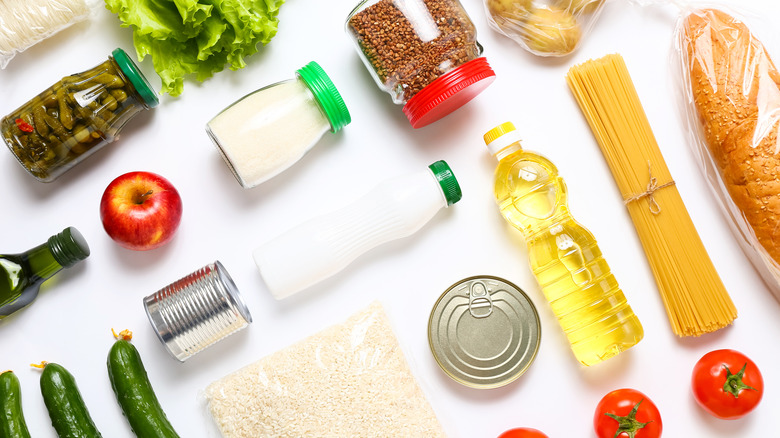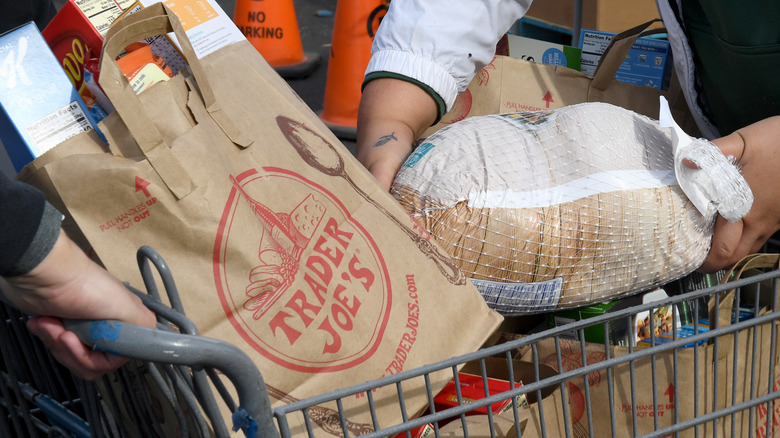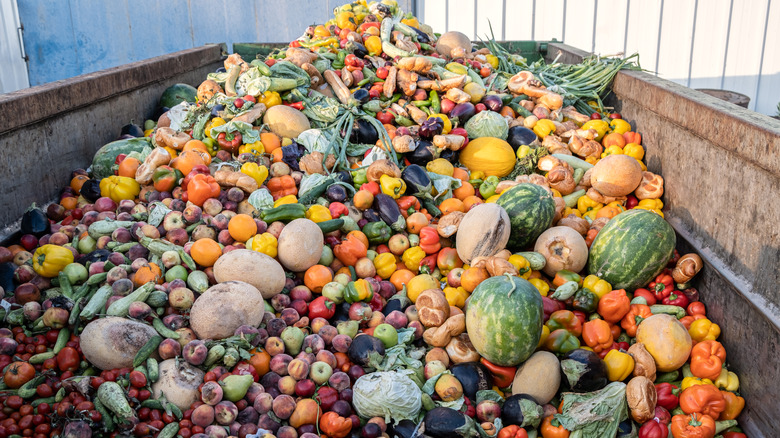The Wholesome Way Trader Joe's Deals With Its Unsold Food
Food waste in the U.S. is a huge problem. According to the U.S. Department of Agriculture, over 1/3 of our annual meat and produce supply is thrown away before it even hits the table. This can be due to several things, like biological damage (from animals, bacteria, and fungi), excessive ordering, and overall poor presentation. In 2010, it was estimated that around 133 billion pounds of food were taken straight to the trash can.
To represent this, imagine the Great Pyramid of Khufu — the largest of the three Pyramids of Giza in Egypt. This wonder stands at an impressive 481 feet tall and approximately 12 billion pounds. Multiply that by 11, and you'll have a pyramid that reaches over a mile in the sky. These numbers fluctuate, so this amount could be much higher than reported.
The U.S. Environmental Protection Agency suggests the most effective way to reduce food waste is to decrease the amount of overly sourced meat and produce. Not only will this be more environmentally safe and friendly (lower amounts of pesticides, Co2 emissions, and stress on overworked animals), but it will also diminish those billions of pounds of wasted food yearly. Besides diminished sourcing, the next best thing is to donate that leftover food to the 10% of food-insecure families (about 38.3 million people) currently struggling in the U.S.
Trader Joe's doesn't take hunger lightly
Along with its incredible products and service, Trader Joe's goes above and beyond for its neighbors in need. TJ's "Neighborhood Shares" program strives to fight national food insecurity by donating all unused or unsold items in the store, including beauty products and flowers. Their only guideline is that they must be in good condition. Outside of its "Neighborhood Shares" program, Trader Joe's redistributes their items through written requests for donations. An estimated 63 million meals were gifted to Americans through both organizations in 2020, equalling almost $350 million in contributions. The grocery chain also donates to Feeding America food banks.
Anna Sacks, better known as @TheTrashWalker on TikTok, told CBS4 News, "When it goes to landfills it releases methane [gas] which is 30 times more potent greenhouse gas than carbon dioxide. So by rescuing this we're not only helping feed people who are in a food desert, but also preventing the environmental harm of food going to a landfill or incinerator."
Pizza Hut and Panera also work to combat food insecurity and waste. Panera's "Day-End Dough-Nation" is the company's bread-and-butter for all unsold baked items. Each night, Panera donates bagels, bread, pastries, and desserts to local charities and other non-profit organizations. Since 1992, Pizza Hut has donated over 94 million pounds of pizza through its "Harvest" program, where leftover pies (including no-shows and incorrect orders) are redistributed to local families.
What's keeping other stores from donating?
Rescuing Leftover Cuisine summarizes that if the U.S. were to redistribute a small 15% of the estimated food that ends up in the landfill, it could cut national food insecurity by half. So, why don't more suppliers participate in this? Unfortunately, it comes down to a lack of effort, unwarranted legal fears, and minimal knowledge.
Many stores want to avoid legal risks when donating food. Despite a federal act that safeguards distributors, many chains fear legal penalties over food that has soured or spoiled during the donation process. However, this is not the sole reason they do not participate in food redistribution. The Food Law and Policy Clinic at Harvard Law School found that only 12 states had laws confirming food safety requirements and donation guidelines. These rules are only partially disclosed and vary across the country. These vague guidelines may make it hard for some distributors to understand their state's legislature. On the other hand, if they are aware, they often do not want to spend the time and effort required to follow those guidelines.
Trader Joe's has an effective system committed to ensuring their donations are tracked and received. This is mainly done by the donation coordinator, who is in charge of that specific location and maintains the store's relationship with other food programs in the area. Outside of their donations, Trader Joe's also aims for a more eco-friendly environment and has increased its sustainability measures to obtain that.


